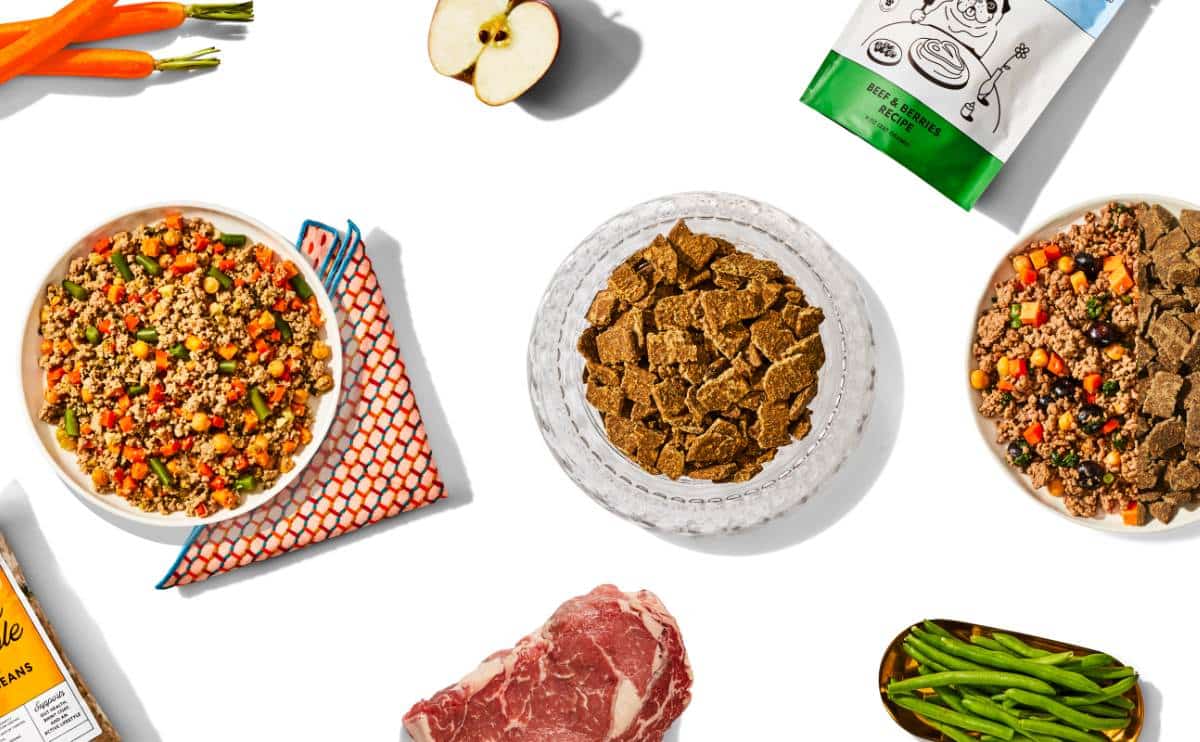Can Dogs Eat Soy Products? Is Soy Safe For Dogs To Eat?
When you purchase through links on our site, we may earn a commission. Here’s how it works.
If you’ve ever been enjoying tofu and wondering whether you can share soy products with your dog, you’re not alone. Unfortunately, the answer to ‘can dogs eat soy products?’ is not a simple one. That’s because many of them don’t include only soy, so there’s more to this answer than a simple yes or no.
Not all dogs will be able to eat foods made for human consumption. Some dogs may have allergic reactions, and some just won’t tolerate it well and end up with an upset stomach, diarrhea, or worse.
In this article, we are going to look at if soy products are safe for dogs. But we will also look at signs and symptoms that may be time to get Fido into your local veterinarian. Let’s jump in!
Table of Contents
What Are Soy Products?

Soy products are made from soybeans, also known as edamame; the bright green bean pods we may sprinkle with salt and eat at our table. The soybean is often used as an ingredient in commercial dog kibble as a nutritious source of digestible protein. You may find it listed as “soya,” “soybean protein,” “soya meal,” or “textured vegetable protein.”
Many feeding trials have shown that dogs can eat foods that contain soy and remain healthy over the long term. Dogs can safely consume soy and soy products as long as the manufacturing process doesn’t include any additives which are not safe for dogs.
So, Are Soy Products Good for My Dog?

We know that dogs can safely consume some soy products. But how do we know if they are good for our dogs? Don’t worry, soy can be considered to be “good” for our dogs. In fact, many dog food manufacturers use it in their dog food formulas because it provides a digestible protein source in their diet.
Manufacturers can choose to add soy ingredients to the mix to make up a complete and balanced recipe that meets all the nutritional needs of your dog. Whether their food contains a soy ingredient or not, you can check the label for the Association of American Feed Control Officials (AAFCO) adequacy statement. This means that the food will have satisfied the nutritional requirements set out by AAFCO. As a result, it will provide your pup with a balanced diet and the nutrients they need.
It is possible to feed a homemade diet using soy ingredients. However, you should ensure that you consult with a board-certified veterinary nutritionist before doing so. They can work with you to formulate a menu using your preferred ingredients while ensuring that all nutritional needs are met.
In the end, when considering what to include in your dog’s bowl, it all comes down to nutrients rather than ingredients. As long as the ingredients you choose are safe, digestible, balanced, and tasty, they will simply act as a vehicle to get the important stuff into their body. The nutrients. Powdered soy product may not seem that appetizing when it’s on an ingredient list, but it still gives them the same nutrients.
What Does the Soy Research Say?

When it comes to special health benefits from soy ingredients above basic nutrition, there is still a lot of research required. A lot of the existing studies have been done in mice or humans. The science is still in the early stages of being able to make any conclusive claims on health effects.
Another thing that makes it difficult to determine any true health benefits is that soy can be processed and cooked in many different ways. There are a variety of products available including ones that are fresh, roasted, fermented, in liquid, or powdered. Additionally, soy-based products can then be prepared in several different ways. It can be served boiled, baked, fried, or eaten raw. That will change how the soy ingredient interacts with the digestive system. This makes it, again, very difficult to pinpoint any special health benefits.
Some of the potential health benefits cited in the literature include protection against diabetes, cardiovascular disease, and certain types of cancer. However, even the research finding these benefits isn’t completely conclusive. We have yet to determine exactly what it is about the soybean that is conferring all these potential protective health benefits.
That being said, if you still want to feed them soy, the following is a list of products that may be included in a balanced diet or used as treats. Before choosing to incorporate soy into your dog’s daily meals, consult with a board-certified veterinary nutritionist to ensure that your pup will still be receiving all essential nutrients in appropriate amounts. If you feed these products as treats, ensure that they make up no more than 10% of their daily caloric intake.
What Types of Soy Can Dogs Eat?

Soy in its vegetable form, is generally safe for most dogs. But what about in other forms? Below we look at some of the more popular forms that Soy comes in, and which of them are generally considered safe.
Soy Sprouts
This crunchy vegetable is usually safe to feed in its raw form without any seasonings or garnishes. Many dogs may turn their nose up at sprouts, so don’t expect your pup to start eating them without some encouragement.
Roasted Soybeans
These can be fed as a treat, but ensure there are no non-dog-safe seasonings or extra salt added. Many types of roasted soybeans will include different types of flavoring, some of which can be harmful to your pet. Watch out for higher salt content, and MSG.
Tofu
This product is made by pressing soy curds into a firm block. If you choose to add this to your dog’s diet, ensure that it doesn’t come with any marinades, sauces, or garnishes which could be harmful to your pup. These additives could be very high in salt or add too many extra calories to the diet.
Tempeh
This is a fermented soy product. If you choose to feed tempeh to your pet, ensure that it does not have any high-calorie or high-sodium sauces used as a garnish. Any products that have non-dog-safe ingredients incorporated should also be avoided.
Soy-Based Dairy Alternatives
These are made by soaking the beans and blending them into a smooth liquid similar to milk. The resulting beverage can be drunk on its own or be used to make dairy treats such as ice cream and yogurt. If you feed this to your pup, ensure there are no added ingredients that may be toxic to dogs. Ones to watch out for in these products are chocolate, xylitol sweeteners, coffee, or macadamia nuts. These are toxic to dogs and should never be fed in any amount.
Can Soy Products Be Bad For Dogs?

Soy has been identified as a dietary allergen in dogs; however, it is not very common. A compilation of research that includes almost 300 dogs with dietary allergies found that only about 6% of them had a confirmed soy allergy. The most common allergies reported were caused by beef (32%) and wheat (17%).
Raw soybeans are not typically consumed in large amounts because of anti-nutritional factors present in the bean, which can interfere with digestion. This is why soybeans are normally cooked, roasted, or fermented before inclusion in the diet.
Soybeans and their hulls are also very high in fiber. If eaten in large amounts, they can give your pet gut upsets and abdominal pain. Additionally, high soy consumption has been found to lead to runnier stools which will be unpleasant during toilet time. With these points in mind, the following is a list of soy products that are best left off their menu.
Which Soy-Based Products Are Bad?
The following products should generally not be given to your pup. They can cause complications during the digestive process, or in general, just don’t carry any nutritional benefit to our canine companions.
Raw Soybean
Raw edamame should not be fed to dogs. They contain a compound that can interfere with digestion if consumed in high amounts. Additionally, if your dog ingests the hulls of the edamame pod, he will be getting a huge dose of fiber in the diet which can lead to an upset stomach, abdominal pain, and runny stools.
Soy Sauce
This sauce is used frequently on our own tables as a salty condiment but it should never be given to dogs. This garnish is very high in salt. Too much salt in the diet can not only cause extreme thirst, which is uncomfortable on its own but also cause salt toxicity which may land your pal at the emergency veterinary clinic. Even the “low-sodium” soy sauces still have too much salt to be safely added to Fido’s bowl.
Miso Paste
This is a fermented soybean product often used in soups and broths. Similar to soy sauce, this paste is very high in salt and best kept off their menu.
Soy Oil
Oils are far too high in fat and calories to be included in your dog’s diet. These are likely to cause nutritional imbalances in their diet which can lead to obesity and other long-term health problems.
Meat Alternative Products
These alternative products can come in many forms of vegan-friendly meat alternatives to hot dogs, sliced sandwich meat, hamburgers, and chicken nuggets, to name a few. These will typically contain many ingredients, some of which may not be safe for dogs. The usual culprits in this category are garlic and onion, which can be toxic to dogs. Additionally, these products tend to be high in calories and can easily tip your dog over their daily allowance.
Soy Protein Powder
This powdered soy product is often used to add to smoothies to increase the protein content. They will often contain flavorings and sweeteners which are not dog-safe. Be on the lookout specifically for xylitol sweeteners, chocolate, or coffee used as flavoring.
Feeding Your Canine Companion Soy

Soy products from the above list of “safe products” can be added to the diet as treats. They should follow the “10% treat rule,” where they make up no more than 10% of your dog’s daily calories.
However, these products don’t tend to make for treats that dogs really crave. This is because they are quite bland on their own. There has been no conclusive research about the health benefits of soy in canines. Because of this, you may want to use something a bit more enticing for your dog’s daily dessert!
You can experiment with many dog-safe treats, including the safe soy products listed above. Cutting up small pieces of fruits and veggies such as bananas, apples, peaches, peas, or zucchini can get you started. There is also a wide selection of commercial treats available that safe to feed and are designed to be extra enticing to your dog.



